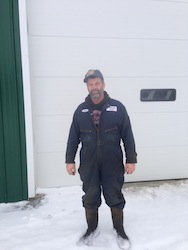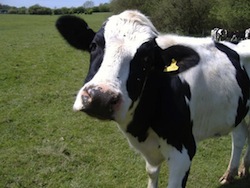Franklin, Vermont farmers Denna and Mike Benjamin were heading into the holidays with a big wish: natural gas to start their anaerobic digester to convert the methane fro their cows’ manure to electricity. The project was partially funded by a federal grant, and if the digester was not operating by year’s end they would lose a major portion of the money.
The challenge they were facing was not living near a natural gas pipleline and a “shot of pure gas” was needed to get the biogas generator going. So the Benjamins called NG Advantage, a company that trucks compressed natural gas (CNG) to very large industrial  customers not located on gas pipelines. The company brings several tractor-trailer loads of gas each day to their large customers, whose factories run their boilers 24/7. These isolated facilities save an estimated 20-40 percent on their fuel bills and emit 26 percent less CO2. The Benjamins hoped that NG Advantage could bring them the much-needed natural gas to get their digester operating.
customers not located on gas pipelines. The company brings several tractor-trailer loads of gas each day to their large customers, whose factories run their boilers 24/7. These isolated facilities save an estimated 20-40 percent on their fuel bills and emit 26 percent less CO2. The Benjamins hoped that NG Advantage could bring them the much-needed natural gas to get their digester operating.
Even though the Benjamins did not need a trailer full of gas, NG Advantage worked with the Benjamins’ engineer, John Forcier of Forcier Consulting Engineers PC, Christopher Herrick, the Chief of the Vermont HAZMAT Response Team, Mike Raker of the Green Mountain Power Renewable Development Fund, Robert Achilles of the Vermont State Agency of Agriculture, and a Canadian company Bio-Methatech, to make a small delivery of gas available to the Benjamins within two days of the phone call. General Transportation of Bridge Water, MA (NG Advantage’s hauler) provide the use of their tractor at no charge to help reduce the cost.
NG Advantage’s VP of Operations and Safety, Gerry Myers, organized the holiday rescue team. He explained why the company went out of its way to help the Benjamins, “Environmental stewardship and embracing the needs of our community at large are embedded in our company’s daily operations. Helping the Benjamin family and Riverview Farm achieve success with their digester project was the right thing to do.”
Denna Benjamin described why it is important for them to build a digester at the Riverview Farm by saying, “We, as other farmers, are looking for ways to diversify our income steam so that we can keep farming. This project seemed like a way to do that and to improve the environment at the same time.”
The Benjamins built the anaerobic digester to use the manure from their cows to create electricity that they can sell back to the grid, to generate heat their farm, and to create a byproduct that provides dry bedding for the cows. By using the methane from the manure to generate electricity, they also eliminate the substantial release of greenhouse gas that would have otherwise naturally occurred.
The Benjamins had applied a Treasury Grant. The grant reimburses eligible applicants for a large portion of the cost of installing specified energy property used in a trade or business or for the production of income. Payment is made after the energy property is placed in service; a payment is not made prior to or during construction of the energy property.
According to Deena Benjamin, “One of the criteria was we needed to be commissioned by  year end, no exceptions. It’s been a race to the finish line. Methane is generated through a time process, we needed to be at 50% methane level in order to spark the generator, we were only at 36% and we didn’t have the luxury of time to wait for it to get there: the genset engineer/representative was required to start the genset and he was scheduled to leave the next day. It was imperative to get help. We will never need assistance again since our cows will take it from here, but NG Advantage was most certainly critical to expedite the level increase needed for commissioning.”
year end, no exceptions. It’s been a race to the finish line. Methane is generated through a time process, we needed to be at 50% methane level in order to spark the generator, we were only at 36% and we didn’t have the luxury of time to wait for it to get there: the genset engineer/representative was required to start the genset and he was scheduled to leave the next day. It was imperative to get help. We will never need assistance again since our cows will take it from here, but NG Advantage was most certainly critical to expedite the level increase needed for commissioning.”
NG Advantage drove its tractor-trailer up to Franklin the evening of the 18th and the morning of the 19th to jumpstart the Benjamins’ digester. The company had to scale back their delivery, which usually carries gas pressurized to 4000 pounds per square inch because this special delivery needed only a small quantity of gas at about 50 psi.
With this shot of natural gas, the digester is now running, providing electricity for a sustainable future for the farm, and a Merry Christmas for the Benjamins.
